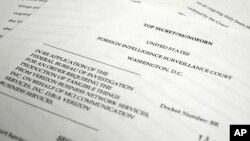The U.S. government is investigating whether the disclosure of a highly classified U.S. surveillance program by Edward Snowden was criminal.
Snowden said Sunday he is the source for news reports of the U.S. National Security Agency's monitoring of phone calls and Internet data for threats of terrorism, a program the Obama administration says keeps America safe from terrorists.
Meanwhile, European officials are examining the spy programs and whether they violated local privacy protections. European governments have been trying to explain whether they let Washington spy on their citizens or benefited from snooping that would be illegal at home
EU officials in Brussels pledged to seek answers from U.S. diplomats at a ministerial meeting later this week in Dublin.
In Washington, lawmakers said they are looking at potential ways to keep the United States safe from terror attacks without giving up privacy protections.
Snowden's whereabouts are unknown since he checked out of a Hong Kong hotel on Monday. He said he will seek asylum in any country that believes in free speech and global privacy.
The information Snowden revealed included a secret court order directing Verizon Communications to turn over all its telephone records for a three-month period, and details about an NSA program code-named PRISM, that collected emails, chat logs and other types of data from Internet companies. These included Google, Facebook, Microsoft, Yahoo, AOL and Apple.
U.S. officials say the program is not designed to listen to telephone calls and the data they gathered has stopped several terrorist plots.
Snowden said Sunday he is the source for news reports of the U.S. National Security Agency's monitoring of phone calls and Internet data for threats of terrorism, a program the Obama administration says keeps America safe from terrorists.
Meanwhile, European officials are examining the spy programs and whether they violated local privacy protections. European governments have been trying to explain whether they let Washington spy on their citizens or benefited from snooping that would be illegal at home
EU officials in Brussels pledged to seek answers from U.S. diplomats at a ministerial meeting later this week in Dublin.
In Washington, lawmakers said they are looking at potential ways to keep the United States safe from terror attacks without giving up privacy protections.
Snowden's whereabouts are unknown since he checked out of a Hong Kong hotel on Monday. He said he will seek asylum in any country that believes in free speech and global privacy.
The information Snowden revealed included a secret court order directing Verizon Communications to turn over all its telephone records for a three-month period, and details about an NSA program code-named PRISM, that collected emails, chat logs and other types of data from Internet companies. These included Google, Facebook, Microsoft, Yahoo, AOL and Apple.
U.S. officials say the program is not designed to listen to telephone calls and the data they gathered has stopped several terrorist plots.





